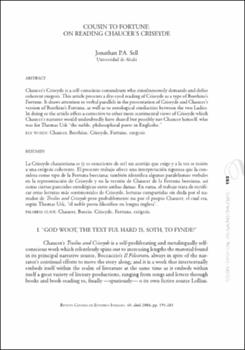Cousin to Fortune: On Reading Chaucer’s Criseyde
Autor
Sell, Jonathan P.A.Fecha
2004Resumen
La Criseyde chauceriana es (y es consciente de ser) un acertijo que exige y a la vez se resiste
a una exégesis coherente. El presente trabajo ofrece una interpretación rigurosa que la considera
como tipo de la Fortuna boeciana; también identifica algunos paralelismos verbales
en la representación de Criseyde y en la versión de Chaucer de la Fortuna boeciana, así
como ciertos parecidos ontológicos entre ambas damas. En suma, el trabajo trata de rectificar
otras lecturas más sentimentales de Criseyde, lecturas compartidas sin duda por el narrador
de Troilus and Criseyde pero probablemente no por el propio Chaucer, el cual era,
según Thomas Usk, “el noble poeta filosófico en lengua inglesa”. Chaucer’s Criseyde is a self-conscious conundrum who simultaneously demands and defies
coherent exegesis. This article presents a dry-eyed reading of Criseyde as a type of Boethius’s
Fortune. It draws attention to verbal parallels in the presentation of Criseyde and Chaucer’s
version of Boethius’s Fortune, as well as to ontological similarities between the two Ladies.
In doing so the article offers a corrective to other more sentimental views of Criseyde which
Chaucer’s narrator would undoubtedly have shared but possibly not Chaucer himself, who
was for Thomas Usk “the noble, philosophical poete in Englisshe.”





